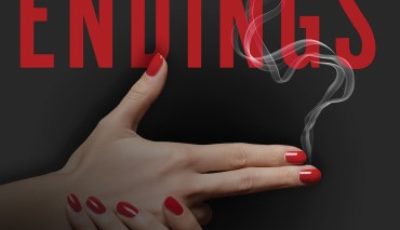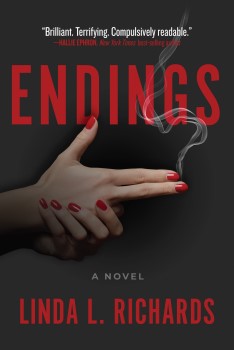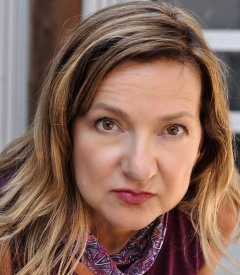

Endings by Linda L. Richards
 ENDINGS is the story of a woman steeped in tragedy who becomes a contract killer, then finds herself on a journey of vengeance and, ultimately, redemption. It is dark, twisty, and uncomfortable. It is also the novel from which “Terminal City,” the author’s award-winning short story published in Vancouver Noir, was carved.
ENDINGS is the story of a woman steeped in tragedy who becomes a contract killer, then finds herself on a journey of vengeance and, ultimately, redemption. It is dark, twisty, and uncomfortable. It is also the novel from which “Terminal City,” the author’s award-winning short story published in Vancouver Noir, was carved.
Linda L. Richards recently spent some time with The Big Thrill discussing her latest thriller, ENDINGS:
Which took shape first: plot, character, or setting?
This is not the case in all of my work, but in ENDINGS it was definitely character.
She is broken and has lost everything, now standing at the edge of a shattered life and wondering why she is even bothering to live anymore.
As the book begins, she sees nothing left to live for. And, truly, that’s something she struggles with throughout the story. Her every breath is fueled by tragedy. Why go on?
What was the biggest challenge this book presented? What about the biggest opportunity?
This is the darkest book I have ever written. The challenge was to keep that feeling of loss and tragedy while ultimately instilling a feeling of hope. That is all of us, really, I think. We all struggle through our own darkness. How do we come to terms with these things? How do we find the strength to find the light?
So back to your question: the biggest challenge was keeping the book from being too unrelentingly bleak. To establish the possibility of redemption and hope without introducing the taste of saccharine. I think I succeeded with that.
How does this book make a contribution to the genre?
I wanted to explore what it might take for a “normal” person—say you or me—to kill someone for money. What would have to happen in your life for you to even consider such a thing? And so, contribution: here we have a hit woman, not smooth and sexy as some in fiction with that job have been; not someone who set out for this career. But someone so broken by life it becomes the only option she sees.
Without spoilers, are there any genre conventions you wanted to upend or challenge with this book?
I didn’t just want to write a book about a hit woman, which was the concept I began with. Someone going around killing people for money—that’s been done a lot. She does a few hits and we’re done like dinner. So it’s not that story. It’s this: life breaks her and she becomes a contract killer. But that undertaking forces her to seek redemption. Because, let’s face it, no matter what terrific reasons you may think you have, killing is wrong. So the book is a complete circle: taking up the life of a hired killer, then trying to make up for the wrongs she has done.
No spoilers, but what can you tell us about your book that we won’t find in the jacket copy or the PR material?
Well, I will say this: ENDINGS is a difficult ride. It is narrated by the protagonist, so you’re essentially viewing the story through the broken view of someone who kills for money. Let’s face it; that’s a big ask. It won’t sit well with all readers. Disturbing, that’s the word I’m looking for. I’m anticipating that some people will find this a disturbing read.
What authors or books have influenced your career as a writer, and why?
So many! It’s really such a long list.
The wonderful P. D. James for her complex and human stories and for showing us again and again that we are people before we are gender. There is so much that connects us: men and women. It’s good to be reminded of that: our commonalities rather than our differences.
Stephen King for his pacing and his humanity. He’s such a craftsman! He uses language so beautifully. I don’t even care what he’s writing about, I just love to read him.
Dashiell Hammett and Raymond Chandler: they use language so differently, but in many ways, they are the founding fathers of noir. I love the spareness of their prose. No extras. And yet (again, both very differently) there is a richness to the enduring stories they told.
*****
Linda L. Richards is a journalist and the author of 15 books, including three series of novels featuring strong female protagonists. She is the former publisher of Self-Counsel Press, the founder and publisher of January Magazine and a contributing editor to The Rap Sheet. She divides her time between Vancouver, Canada; Phoenix, Arizona; and Paso Robles, California.
To learn more about the author and her work, please visit her website.
- LAST GIRL MISSING with K.L. Murphy - July 25, 2024
- CHILD OF DUST with Yigal Zur - July 25, 2024
- THE RAVENWOOD CONSPIRACY with Michael Siverling - July 19, 2024

